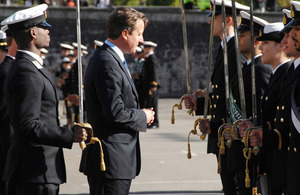Prime Minister takes the salute at Royal Naval College
The Prime Minister, David Cameron, has taken the salute at Britannia Royal Naval College as 68 cadets became the first to complete a newly-enhanced Initial Naval Training Course for officers, introduced in February 2012.

Prime Minister David Cameron inspects the 68 Officer Cadets at Britannia Royal Naval College in Dartmouth [Picture: Crown Copyright/MOD 2012]
A total of 256 Royal Navy personnel were on parade at the Britannia Royal Naval College in Dartmouth to mark the occasion as Mr Cameron inspected the successful cadets, watched by their families and friends.
Addressing the parade, the Prime Minister said:
The Royal Navy is absolutely fundamental to our security as an island nation. And it’s a vital part of our heritage.
The challenges you face over the coming years may place demands on you experienced by few others of your age in the world today. Despite the technology of today, being in the Armed Forces is an intensely human business.
It is based on personal relationships and the ability of people like you to lead your fellow men and women, even in the face of danger. And there is no greater honour that a nation can bestow than the trust to lead your fellow men and women. That is the task you will have. Your training here has given you the best possible start.
Among those completing training was 21-year-old Midshipman Miles Amery from Torquay, whose father Chief Petty Officer Bill Amery also works at the college. He said:
Completing the maritime leadership exercise on the River Dart was one of the most enthralling weeks of the course. It was challenging, hard work, we were sleep-deprived, but overall it was great fun.
Passing the exercise and being assessed as strong was a huge highlight of training. Training on board HMS York was another exciting part of the course.
CPO Amery has served in the Royal Navy for nearly 36 years. He has served both at sea and ashore all around the world; the last six years as an instructor of Officer Cadets at Dartmouth. He said:
To be able to stand alongside my son at his passing out parade is the proudest day of my life. Our family’s union with the Royal Navy goes back many generations. To be able to present my grandfather’s naval sword to him was a unique moment.
Miles has an exciting, challenging and rewarding career ahead of him. Needless to say, I shall be following his every move with envy. My only hope is that I don’t have to bump into him every day and have to salute and call him sir!
The new course was introduced in February 2012 and is split into three distinct ten-week phases known as Militarisation, Marinisation and Initial Fleet Time. While the first two phases take place primarily at the college, the third is conducted on board a warship at sea.
The new course is two weeks longer than its predecessor and is underpinned by nine core maritime skills that are the foundations of naval life and essential to operational effectiveness.
Captain Jerry Kyd, the Commanding Officer of Britannia Royal Naval College, said:
The modern naval officer needs to be robust and able to adapt to whatever the mission demands, from war-fighting and maintaining security at sea to providing humanitarian aid to a community hit by some form of disaster.
This new course involves more time on the water and teaches the cadets how to operate and lead in readiness for the challenges at the front line.
It is progressive and designed to ensure that the cadets are better equipped to undertake assignments both at sea and on land, working jointly with other parts of the UK Armed Forces and in partnership with other nations.
We also train promising aspirant officers from around 20 allied nations; these personnel undergo the same training as their British counterparts.
We were delighted to have the Prime Minister as the guest of honour at the parade to celebrate the success of this latest group of Officer Cadets.
They have displayed commitment and courage in completing this intensive and demanding course and are fine examples of the quality of people serving in today’s Royal Navy and in the navies of our allied nations.
The new course also delivers improved fitness levels with training provided using a disciplined method of military fitness which focuses on developing co-ordination and individual physical strength and endurance.
Command, leadership and management training is a constant thread throughout the course, with emphasis on coaching, mentoring and development activities.